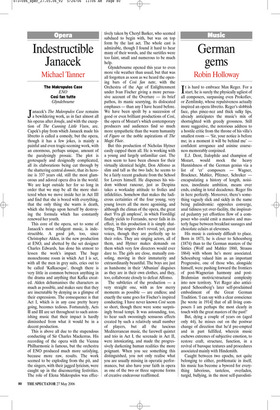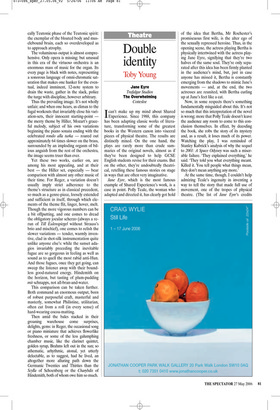German gems
Robin Holloway
It is hard to embrace Max Reger. For a start, he is surely the physically ugliest of all composers, surpassing even Prokofiev, or Zemlinsky, whose repulsiveness actually inspired an opera libretto. Reger’s slobbish face, plus pince-nez and thick sulky lips, already anticipates the music’s mix of shortsighted with greedy grossness. Still more suggestive, the notorious address to a hostile critic from the throne of his villa’s smallest room — ‘Sir, your notice is before me; in a moment it will be behind me’ confident arrogance and asinine coarseness memorably conjoined.
E.J. Dent, Italophile and champion of Mozart, would mock the heavy Hunnishness of the German genius via a list of ‘er’ composers — Wagner, Bruckner, Mahler, Pfitzner, Schreker encapsulating a history of length, noisiness, inordinate ambition, means over ends, ending in total decadence. Reger fits in here perfectly. Moreover, there’s something vaguely slick and sickly in the name being palindromic: opposites converge, anal tidiness yet over-facility, the inspissated pedantry yet effortless flow of a composer who could emit a massive and masterly fugue between breakfast sausages and chocolate eclairs at elevenses.
His music is curiously difficult to place. Born in 1873, he is closer to Schoenberg (1874) than to the German masters of the Sixties (Wolf and Mahler 1860, Strauss 1864) with whom he’s more associated. Schoenberg valued him as an important Progressive, one of those who, alongside himself, were pushing forward the frontiers of post-Wagnerian harmony and postBrahmsian motivic/structural complexity into new territory. Yet Reger also anticipated Schoenberg’s later self-proclaimed embodiment of the Great German Tradition. ‘I can say with a clear conscience [he wrote in 1914] that of all living composers I am perhaps the most clearly in touch with the great masters of the past!’ But, dying a couple of years on (aged only 44), he misses out on the postwar change of direction that he’d pre-empted and in part fulfilled, wherein music eschews extremes of subjective emotion, to restore craft, structure, function, in a revival of baroque textures and procedures associated mainly with Hindemith.
Caught between two epochs, not quite belonging to either, problematic in itself, his music has become a byword for everything laborious, tasteless, overladen, turgid, bullying, in the most self-parodisti cally Teutonic phase of the Teutonic spirit: the exemplar of the bloated body and musclebound brain, each so overdeveloped as to approach atrophy.
The voluminous output is almost comprehensive. Only opera is missing; but unusual in this era of the virtuoso orchestra is an enormous mass of music for the organ. Its every page is black with notes, representing a sonorous language of omni-chromatic saturation that makes one hanker for the eventual, indeed imminent, 12-note system to drain the waste, gather in the slack, police the turge with discipline, however arbitrary.
Thus the prevailing image. It’s not wholly unfair; and when one hears, as climax to the fugal workouts that invariably close his variation-sets, their innocent starting-point the merry theme by Hiller, Mozart’s graceful melody, subject of his own variations beginning the piano sonata ending with the celebrated rondo alla turka — roared out approximately 64 times slower on the brass, surrounded by an imploding orgasm of bilious anguish from the rest of the orchestra, the image seems truer than ever.
Yet these two works, earlier on, are among his most appealing, and at their best — the Hiller set, especially — bear comparison with almost any other music of their time. For Reger, a variation doesn’t usually imply strict adherence to the theme’s structure as in classical precedent, so much as a genre-piece, loosely extended and sufficient in itself, through which elements of the theme flit, linger, hover, melt. Though the more vigorous numbers can be a bit offputting, and one comes to dread the obligatory jocular scherzo (always a rerun of Till Eulenspiegel without Strauss’s brio and mischief), one comes to relish the slower variations — tender, warmly inventive, clad in shot-silk instrumentation quite unlike anyone else’s: while the sunset adagios invariably preceding the inevitable fugue are so gorgeous in feeling as well as sound as to quell the most rabid anti-Hun. And those fugues, once they get going, can sweep the listener away with their boundless good-natured energy. Hindemith on the horizon, but tasting of plum-pudding mit schnapps, not all-bran-and-water.
This comparison can be taken further. Both command an enormous output, born of robust purposeful craft, masterful and masterly, somewhat Philistine, utilitarian, often cut from a roll (in every sense) of hard-wearing cocoa-matting.
Then amid the bales stacked in their groaning warehouse come surprises, delights, gems: in Reger, the occasional song or piano miniature that achieves flowerlike freshness, or some of the less galumphing chamber music, like the clarinet quintet, golden syrup, Brahms left out in the sun; so athematic, arhythmic, atonal, yet utterly delectable, as to suggest, had he lived, an altogether more alluring path down the Germanic Twenties and Thirties than the Scylla of Schoenberg or the Charybdis of Hindemith, both of whom owe him so much.











































































































 Previous page
Previous page